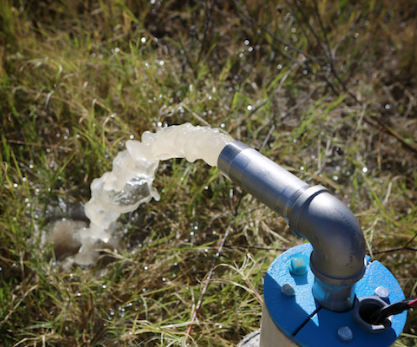Our Water > Nitrates
Protecting Drinking Water from Nitrate Pollution
Groundwater is a vital resource for families, communities, and industries across Wisconsin. Many Wisconsinites rely on private wells for clean drinking water, but nitrate pollution has made that water unsafe for thousands and is now the state’s most widespread groundwater threat.
Jump to Section
Explore Our Approach
Overview
What Is Nitrate and How Does It Get Into Groundwater?
Nitrate is a form of nitrogen—a vital element for all living things. It moves through the environment much like water, and in a farm-heavy state like Wisconsin, it’s commonly added to fields through fertilizer and manure to boost crop growth.
But too much nitrogen leads to problems. Excess nitrate easily leaches into groundwater, especially in areas with sandy soils or cracked bedrock that allow water to flow quickly underground—without filtering out pollution.
While septic systems contribute to nitrate levels, agriculture is responsible for an estimated 90% of the nitrate pollution in Wisconsin’s groundwater.
25%
Of Wisconsinites use private wells for drinking water
80,000
Private wells are contaminated with unsafe nitrate levels
90%
Of nitrate pollution comes from agriculture
$80M
Estimated yearly cost of nitrate pollution in healthcare and related expenses
Videos
Stories That Matter
https://youtu.be/bfFdOl4Hnso
Vicious Cycle: The Chance For Contamination
https://youtu.be/dPG42t67jLo
Vicious Cycle: The Struggle For Clean Water
Health Effects
What’s at Risk?
Too much nitrate in drinking water can harm everyone—not just young children or pregnant women. The economic cost is staggering too. A study by Clean Wisconsin and EWG estimates nitrate pollution leads to $80 million in healthcare costs every year. Linked health risks include:
Blue Baby Syndrome
Nitrate reduces oxygen in infants’ blood, leading to serious illness and potentially fatal complications.
Neural birth defects
Exposure during pregnancy increases the risk of spinal cord, brain, and skull malformations in newborns.
Thyroid disease
Nitrate disrupts hormone production, increasing the risk of both hypothyroidism and thyroid cancer over time.
Colon cancer
Chronic nitrate exposure may cause cellular changes in the colon, increasing cancer risk.
Non-Hodgkin’s lymphoma
Nitrate exposure is linked to immune system damage, which may raise the risk of developing this blood cancer.
Case Study
Contaminated Wells in Southwest Wisconsin

Southwest Wisconsin’s shallow soils and fractured bedrock make groundwater especially vulnerable. After years of advocacy, Clean Wisconsin helped push for a regional study in Grant, Iowa, and Lafayette Counties.
Initial testing found that 42% of wells were contaminated with nitrate, coliform bacteria, or both—well above the state average.
The findings helped spur the creation of the Speaker’s Task Force on Water Quality and highlighted the urgent need for better policies and funding to protect drinking water in the region.
KEY INITIATIVES
What Are We Advocating For?
Clean Wisconsin is leading the charge to protect drinking water from nitrate contamination. We work with state agencies, lawmakers, and local partners to advance science-backed policies that reduce agricultural pollution, protect public health, and support impacted families—especially those in rural communities where private wells are most at risk.

Advancing Statewide Nitrogen Use Rules
We’ve advocated for the development of administrative rules that regulate how nitrogen fertilizer and manure are applied to farm fields. These rules aim to limit nitrate pollution, especially in areas with vulnerable soil and geology.

Increased Funding to Address Contamination
Clean Wisconsin supports expanding funding for contaminated well compensation, county conservation staffing, and water quality monitoring—key pieces of a long-term solution.

Addressing Public Health Risks
We work to raise awareness of the health risks linked to nitrate pollution, including Blue Baby Syndrome, birth defects, and certain cancers, ensuring decision-makers prioritize clean drinking water in public health efforts.

Supporting Farmers
We advocate for funding and resources that help farmers adopt conservation practices and reduce fertilizer runoff—so protecting groundwater doesn’t come at the cost of farm livelihoods.
Resources
Nitrate Pollution Resources
Stay up to date on nitrate contamination and what we’re doing to fight it.
Press Releases
Proposal to increase E15 ethanol use would cause substantial health harms in Wisconsin
A proposal in Congress to allow 15% ethanol blends (E15) in auto fuels year-round would increase dangerous water contamination and air pollution across Wisconsin.
See NewsLatest News
Expert Insights
Clean Wisconsin joins agricultural, environmental groups to address rural drinking water pollution
While Wisconsin’s water quality challenges have received more attention from lawmakers the last couple of years, we haven’t seen the bold, transformative policies necessary to put Wisconsin on a firm path to cleaner water come to fruition. A host of complications, from a once-in-a-century pandemic to continued resistance from key lawmakers, have preserved the frustrating
Read MoreExpert Insights
Latest Podcast
Action Alert
sign up
Join the Fight Against Nitrate Pollution
Sign Up For Email Updates
"*" indicates required fields